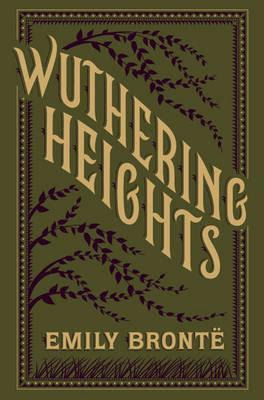Is it Worth the Read? Wuthering Heights

Image courtesy of bookdepository.com
By Caroline Morris
Wuthering Heights is the unsung novel of the Victorian period, and you cannot convince me otherwise.
A little history is important to understand Wuthering Heights by Emily Brontë. Emily was one of the three Brontë sisters, all of whom were authors. However, they were not easily published due to the misogyny of the time period, and they had to publish under male pseudonyms.
Emily Brontë published Wuthering Heights in 1848, a year after Charlotte Brontë released Jane Eyre. Sadly, Wuthering Heights did not sell nearly as well as Jane Eyre.
Even from the start, society did not give Wuthering Heights its due, and I, for one, have had enough. I love this book.
But I love it because it is so hateable.
Allow me to clarify: the novel is incredibly well written and has many literary merits. But the true wonder and true loathsomeness of this novel come from its main characters, Catherine and Heathcliff.
These two characters are introduced when Cathy’s father, Mr. Earnshaw, brings home a dark, abandoned “gypsy” boy he found whom he intends to raise.
Heathcliff is not exactly welcomed by Cathy’s brother, Hindley, especially as Mr. Earnshaw comes to prefer his foster son to his legitimate one. But the dislike and eventual abuse of Heathcliff is not entirely unwarranted; he is a dark and strange boy. But not when he is with Cathy.
The two have an unbreakable and inimitable connection, which sounds utterly romantic. Right?
No and yes. Their love story is one fraught with basically every red flag a reader could imagine. This relationship is exactly what makes Wuthering Heights so enthralling.
Catherine and Heathcliff are terrible people, not only to each other but to everyone around them. Brontë makes the reader hate them individually because they are manipulative and abusive. But even as they poison the lives of everyone around them, their undying love for one another remains. So even though you objectively know that these two are horrible, they are terrible in a way that they are perfectly built for one another. No one deserves to have to suffer either of them except the two of them.
Brontë builds this unique characterization and fraught romance masterfully, especially considering a relationship so paradoxically complex and compelling was entirely new. Then, of course, she must madden the reader’s conflicted emotions with the most romantic quote ever written.
Cathy explains: “He’s more myself than I am. Whatever our souls are made of, his and mine are the same.”
My brain has never been the same since I read the concept of two souls being made of the same substance.
Their relationship is the reason this novel should be given more credit as a significant literary work. Brontë was innovating a relationship and overthrowing the traditional “marriage plot” more radically than even Jane Eyre.
There are also many other elements of Wuthering Heights that distinguish it. The dark natural setting is dreamy and intense and harkens back to the Romantic Period. The novel engages in a critique of human behavior and classism. It also utilizes impressive techniques, such as the use of dialect and the Gothic choice to tie the landscape to emotion.
However, I can be objective about the novel’s pitfalls. Wuthering Heights operates within a frame narrative that ultimately proves a very intriguing structure but is a difficult opening to get through.
Additionally, an addictingly toxic relationship is not for everyone, no matter how innovative I may argue it.
I absolutely recommend Wuthering Heights. But if you are not a fan of morally ambiguous relationships, hate somewhat dense writing, or cannot get past the strange name, then it may not be the novel for you.
Whether or not you love the novel or hate it, or have a love-hate relationship with it—which is probably the appropriate response—remember this: Emily Brontë deserves recognition for this unique masterpiece.





